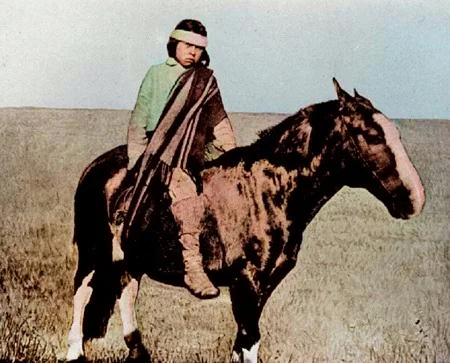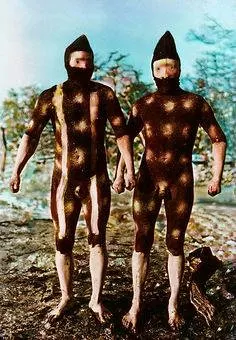Columbus Day
By Rolando Hanglin |
LA NACION

We Argentines have a defect that is, at the same time, our cardinal virtue. We are, in large part, grandchildren of gringos. Therefore, we ignore almost everything regarding the history of our country. We are part of the human tide that came down from the ships between 1880 and 1920, when the corpses of thousands of victims were not yet well covered by the pious earth. Indians and Christians, hostages and captives, chieftain (
caciques) and soldiers (
milicos), all of them who fell in the great Indian-Christian war, between 1820 and 1890.

Being, then, half gringos, we could know little about the raids, the forts, Roca and Villegas, Pincén and Calfucurá. To us, the Indians were guys with feathers that appeared in cowboy movies! Always losing the battle.
We are, in large part, grandchildren of gringos. Therefore, we ignore almost everything regarding the history of our country.
That is why we are surprised that, today, the supposed descendants of those Indians, today called "Mapuches", claim properties in places like Bariloche, Aluminé, La Angostura and even Toay, La Pampa.

Let's go in parts.
Actually, the term "Mapuche" was invented by the North American ethnologist Edmond E. Smith in 1850, and later spread in different countries of America. The meaning is clear: mapu: land; che: people. In the same way, myself, a fan of the Patagonian language (mapu-dungún) I have baptized my weekend country house "Epu-Trehua" (the two dogs) and a little chalet I have in Chapadmalal, "Antu-Catán " (house of the sun) without claiming any historical roots.
Reading the works of Lucio V. Mansilla, Estanislao Zeballos, Manuel Prado and other authors from the time of the forts, we never find the word "Mapuche". No such tribe or nation was ever spoken of. The literature of 1820-1880 does speak of the Pampas, the Serranos, the Araucanians or Chileans, the Vorogas, the Tehuelches, the Tubichaminís. But the word Mapuche never appears. History and anthropology agree that Argentine territory, from San Luis to the south, was occupied by the northern Tehuelches (pampas, aoniken), the southern Tehuelches (pampas, guenaken) and the Tehuelches who had crossed over to the island, known as onas. These countrymen were part of a community of hunter-gatherers. They did not farm the land or uphold the concept of private property or national boundaries. Just that of "living space", which moved settlements in those immense extensions, always looking for abundant hunting of guanacos, deer, piches, ostriches. They occupied, then, without occupying it, an immense country. It is believed that these Tehuelches (or their ancestors) stamped the rock walls of the Cueva de las Manos 8000 years ago. Casamiquela affirms that when Carmen de Patagones was founded, the Tehuelches began to traffic rhea feathers and guanaco skins. They did the same in Punta Arenas, in 1850, and in 1865 with the Welsh colony, in the Chubut valley. It was an activity of economic significance far superior to what it may seem today. All the testimonies agree that the Tehuelche people were peaceful and dispersed.

Hence, it's quite unusual to witness the emergence, even in 2012, of communes, movements, or unions identifying as "Mapuche" that assert claims over territories in Chubut, Río Negro, Neuquén, and Santa Cruz. Where do these groups originate? Are they indigenous peoples of our nation, to whom the Republic owes redress for its past injustices in usurping their lands and undermining their means of sustenance?
The Mapuche is Chilean and entered the sphere of the Argentine pampas in 1820, expelled by the internal wars in Chile.
We are going to leave the answer to Mr. Rodolfo Casamiquela, ethnologist and anthropologist who died in 2008, but not without writing 24 books and 200 monographs on the subject. Casamiquela, born in Jacobacci, considered himself the last man capable of correctly pronouncing the northern Tehuelche language (that is, "pampa") and his verdict was overwhelming: "The Mapuches are Chileans."
Other concepts: "Today only the Mapuche is spoken of. The Tehuelches suppressed themselves or forgot their own history, despite the fact that today there are many descendants, such as the Chagallo, Yanquetruz, Sayhueque, Foyel, Catriel, Chiquichano, Chelqueta, Chingolé, Chalao, Chacamata, Cual. These families are the Tehuelches that remain, that is, the so-called pampas. They were a lineage of enormous potential power, which gradually became Araucanized or Mapuchized based on their language. The Mapuche is Chilean and enters the sphere of the Argentine pampas in 1820, expelled by the internal wars of Chile. Many Chilean Indian chiefs sided with the King of Spain and, in the context of a war to the death, crossed the mountain range to save their lives. Here they were received by some relatives and , little by little, authorized by Brigadier Juan Manuel de Rosas to settle in the provinces of the Río de la Plata.
One wonders if the Tehuelches, a native people of Pampa and Patagonia, were exterminated by the Chilean Araucanians, or by the Argentine military forces, or by someone.
Casamiquela: "The issue is the language. To negotiate with Spanish, the so-called parliaments were held, that is, oratory and diplomacy assemblies where each chief (ulmén) with his little capitains (capitanejos) or little chieftain (caciquillos), and the representatives of the White or huinca (derived from the Incas, who also tried to subdue the Araucanians with little luck) competed in speeches and rhetorical figures to "adjust peace". In this diplomatic field, the Mapuche language was far superior to Tehuelche. Precise, clear, beautiful, simple, rude, Mapudungun is a very valuable language. With it religion penetrates, then the Mapuche predominates over the Tehuelche".

Our conclusion is that the Chilean Mapuches did not annihilate the Argentine Tehuelches; instead, they formed separate federations where Mapuche military leadership consistently held sway. As corroborated by meticulous historical travelers like the Englishman Musters, the Tehuelches were often characterized as "nomads, wanderers, free spirits, and undisciplined."
Professor Casamiquela asserts, "The Mapuche presence in Argentina lacks deep historical roots. They have been here for around a century." In this respect, they are akin to the Italians, Irish, or Croats. Casamiquela further explains, "When Professor Erice, the author of the most comprehensive Mapuche dictionary, arrived in our country, he found no speakers of that language in Viedma. Here in Jacobacci, there were the Linares, descendants of a captive bearing that surname who married the daughter of a Tehuelche chieftain, based near the Juncal lagoon, but they were Tehuelches. Creoles with surnames like Entrage or Castelo also belong to the Tehuelche heritage. In summary, the claims that the Mapuches make today regarding land rights... they simply do not have a historical basis. This is history, not conjecture. Currently, political dynamics are in play. Consequently, Chilean Mapuches declare themselves as Argentines and begin asserting a long-standing presence in our country. Historians are not primarily concerned with this aspect. What a politician or lawyer may argue... that is another matter altogether."

The tall and pensive Tehuelches were subjected to colonization and undoubtedly deceived by both Argentine settlers and Chilean Araucanians. Historically, the name Patagonia conjures images of a land inhabited by men with exceptionally large feet and towering stature.
Casamiquela explains, "The Spaniards, who were of shorter stature, often looked down at the Tehuelches as they stood atop the dunes. In 1896, a Frenchman named Delavaux conducted an excavation along Route 40 in southern Chubut, unearthing a Tehuelche burial site and measuring the skeleton of the interred individual, which reached a height of 1.99 meters. Another excavation, this time in Península Valdez, confirmed individuals reaching a height of two meters. They are indeed the tallest ethnic group in the world."
While they were of considerable stature, the Tehuelches were also known for their vices, free-spirited customs, docility, and kindness. They formed amicable relations with the Welsh settlers in Chubut and, in general, did not cause trouble. They allowed themselves to be influenced first by the Chilean Araucanians and later by the Argentine Republic.
One of the last heroic figures of the Tehuelche or Pampa lineage was undoubtedly Chief Pincén, whose name was remembered as Vicente, Juan, or Francisco Pincén, depending on the region. The surname is correctly pronounced as Pisen, Piseñ, or Pincel, always emphasizing the accent on the "i."

There are four pictures of Pincén. In these images, we see him with his characteristic fluke, colt boots, a short spear, his testicles hanging around his neck, his bare torso, long hair held in place by a headband, and he appears strikingly similar to Alberto Olmedo! He could also bear a resemblance to Don Alberto Rodríguez Saá, though the latter, more robust in build, still possesses the stature and charisma of his Ranquelino forebears.
Some individuals reject Columbus Day because it seems to categorize humanity on the same plane as creatures like golden retrievers or Hereford cows. The truth is, all humans belong to the same species, but there exist significant ethnic variations; a Swede is not the same as a Senegalese.
The tall and introspective Tehuelches were subjected to colonization and, undoubtedly, taken advantage of by Argentine settlers and Chilean Araucanians, who primarily ventured into our pampas to steal cattle and capture fair-haired women. Along the way, unfortunate confrontations with Argentinians, including violent encounters, were inevitable. It was an unfortunate reality.
However, that's a different story. For now, we conclude this humble note with a traditional Patagonian greeting, one that is still used today when travelers cross paths: "Mari-mari." This phrase literally translates to "ten-ten." Wishing you good fortune, and sometimes, to convey a warmer farewell in passing, it is articulated more fully: "Mari-mari peñí." In other words, "Goodbye, brother."
NOTE: The sources for this article come from the website "Los Matuastos- Periodismo" (Sunday September, the 9th 2012) and "Pincén, vida y leyenda" wrote by Juan José Estévez, and published in 2011.




































